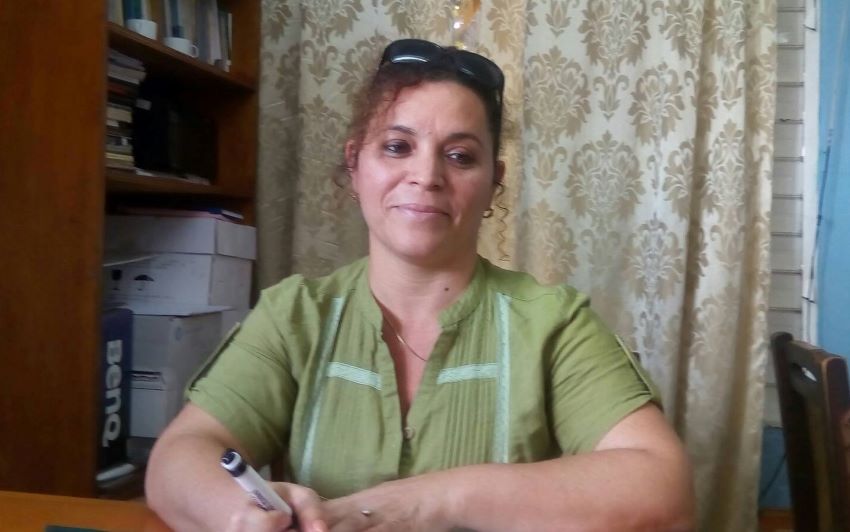
Amara Morales Cordero, current sub-delegate of Science, Technology and Innovation of the Delegation of the Ministry in charge of this activity and the environmental sphere in Las Tunas, began work two decades ago in an organization that in Cuba, as in no other underdeveloped country, is neuralgic for progress. Then, the young History graduate began a path full of challenges and new directions.
Las Tunas, Cuba.- Attention to the Territorial Program of Social Sciences and the coordination of the work of the Provincial Council of this branch were her first functions. Since that time, the path has been fruitful and intense in chores. On the occasion of celebrating this January 15, the Day of Cuban Science, 26 spoke with this woman, one of the many whom in the Balcón de Oriente (Balcony of Eastern Cuba) amasses the effort to put thought and awareness to the reality of the nation.
The scientific community in Las Tunas has arrived at this date, says Amara Morales, after a difficult 2020 that involved delays in the realization of many ideas and projects. However, in this period, "scientific and innovation activities have made their contribution to confronting the pandemic and also with proposals so that the province can continue to develop in the economic and social order. We have recognized results that impact on the health, food production and business and service activity," she outlines.
Science mainstreams all of society and in that sense Las Tunas designs projects towards aspects of reality in which the local authorities and the guild consider more emphasis should be placed...
"Just a year ago, 13 policies were approved that are linked to science, technology and innovation. They give the possibility of using the results of the sector in pursuit of development. We have just approved the legal regulations that implement them and, on everything in Las Tunas, the one that has the greatest expression is the reorganization of the Science, Technology and Innovation System. In this context, we were able to readjust the territorial programs and the Government approved the lines of research that respond to knowledge gaps and where managers, professionals, students and scholars have the possibility to participate.”
In this regard, Morales Cordero stresses that food production, climate change, the development of society, and the evaluation of indicators such as population aging, marginalization and employment are the focus of this agenda, in which local development and necessary autonomy of the municipalities are also included.
"The final objective - she emphasizes - is to provide a scientific result, a new or improved product or service that constitutes itself an innovative project. Although the pandemic prevented progress in this regard, this year we are working on the implementation of the initiatives."
The sub-delegate of the local agency of the Ministry of Science, Technology and Environment (CITMA) adds that the new policy conceives research projects as a non-salary incentive for those who look towards science. "We encourage those interested to approach the institution to evaluate the ideas they have and offer them the necessary advice so that they can carry out the line of research of their interest."
She also highlights the importance of the two existing universities here and the business sector in territorial progress and in the advancement of this sector, in particular, as the province does not have research centers as is the case in other areas of the country.
"We plan to increase science entities in the territory; achieve that companies are certified and registered as such. For example, ACINOX already has two national innovation awards, the Metal Structures is an innovative company, LUDEMA Furnitures is recognized in the country for its designs and high standard productions… It is a necessity that the business area takes this step so that it fulfills its functions and contributes to the progress of Las Tunas,” she insists.
It is also about the practice of knowledge, these companies are already doing science on a day-to-day basis; which then results in what we all hear and sometimes we do not understand well what it is about, that is, the Gross Domestic Product.
"Likewise, it is an activity that starts with the very planning of business activity. That is, how is science conceived in a transversal way as a basis for development? How do we incorporate it into the development and business strategy of each company? The President and the country are calling, more and more, for the use of science and innovation, for the incorporation of all knowledge, to take into account all those who can contribute from their talent. And that's what we're asking for from here, too.
It is not about abstractions, but rather that the productions of intelligence have an impact, in a tangible way, in the workers, in an entity, the territory and, finally, in the country. Amara Morales redounds in this thought, with the conviction that it is possible and necessary to connect each idea with reality and, in short, contribute to a nation that seeks sovereignty and social justice. In that dream, she argues, is and will indisputably be the contribution of the scientific community of Las Tunas.





